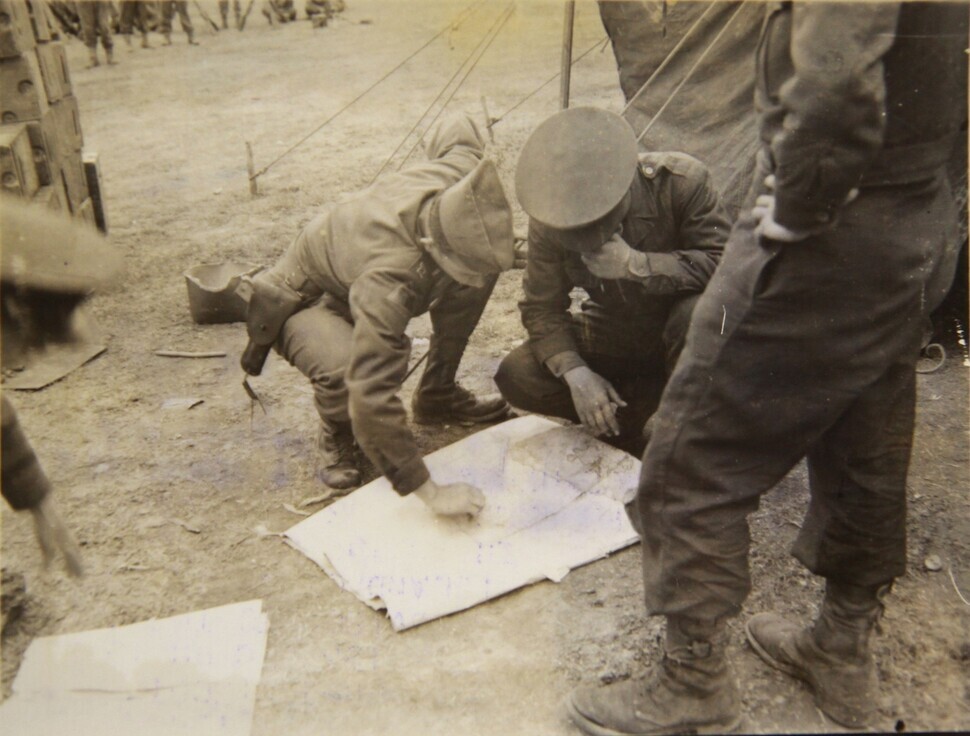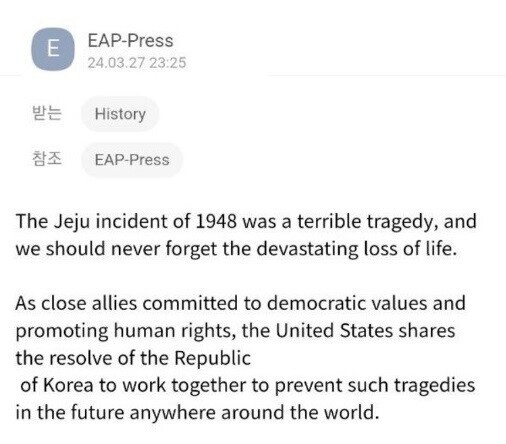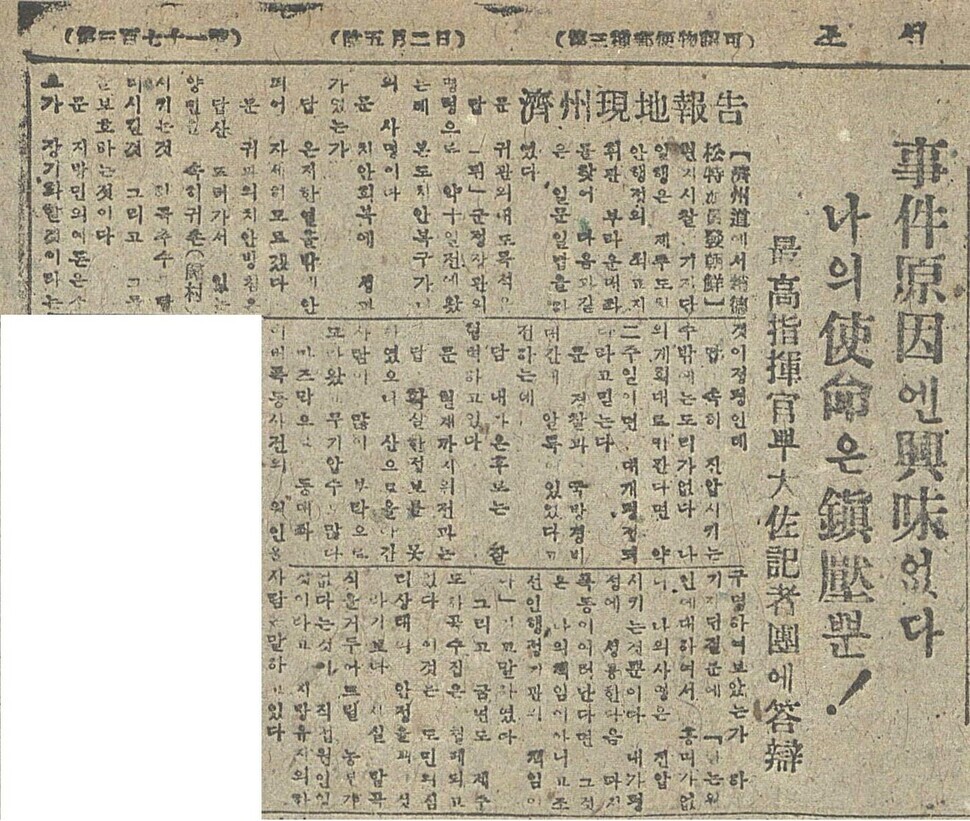hankyoreh
Links to other country sites 다른 나라 사이트 링크
US calls Jeju April 3 Incident a ‘terrible tragedy’ in first statement on bloody history

For the first time, the US State Department has characterized the Jeju April 3 Incident as a “terrible tragedy” and an incident that “we should never forget.”
The US government officially ruled over the southern part of the Korean Peninsula from September 1945 to August 1948, but has until now remained silent in the face of criticism that it was directly and indirectly responsible for the outbreak and the spread of the bloody incident that left thousands dead and missing on the Korean island.
In reply to an email sent by the Hankyoreh asking about the US’ official position on the Jeju April 3 Incident on March 27, the US State Department answered, “The Jeju incident of 1948 was a terrible tragedy, and we should never forget the devastating loss of life.”
“As close allies committed to democratic values and promoting human rights, the United States has the resolve of the Republic of Korea to work together to prevent such tragedies in the future anywhere around the world,” the US State Department added.

This marks the first time in 76 years since the uprising and massacre in Jeju that the US has stated its position on the issue in an official document. Modern history researchers and the Jeju community have long contended that one of the remaining roadblocks to resolving the tragic history is a lack of accountability on the part of the US government.
Various documents drafted by the US Army Military Government in Korea, the Provisional Military Advisory Group (later renamed the Korean Military Advisory Group), and the US Embassy in Korea during the Jeju April 3 Incident show that the US was directly and indirectly involved in the suppression of the uprising.
The “Jeju 4·3 Incident Investigation Report” published by the South Korean government in October 2003, states, “The US Military Government and the Provisional Military Advisory Group (PMAG) are not free from being responsible for the occurrence and suppression of the 4·3 Incident. Such incidents occurred under the US Military Government regime and the US Army Colonel in Jeju directly commanded the Suppression Operation.”
In Korea, civil society organizations have been calling for the US to recognize its role and take accountability since 1988, when the movement to investigate the tragedy, determine the truth, and restore the honor of victims began in earnest.

In October 2018, the 70th anniversary of the Jeju April 3 Incident, related organizations such as the Jeju 4·3 Research Institute and the Association for the Bereaved Families of 4·3 Victims collected 100,996 signatures calling on the US to admit responsibility and delivered them to the US Embassy in Seoul. The embassy, however, has still yet to comment on or respond to the petition.
In mid-to-late April 1948, shortly after the uprising, US military authorities ordered Maj. Gen. William F. Dean of the US Army Military Government in Korea and Lt. Gen. John R. Hodge, the commander of US armed forces in Korea, to suppress the unrest on Jeju.
In May 1948, Col. Rothwell H. Brown, the commander of the 6th Division’s 20th Infantry Regiment, was dispatched to Jeju Island as the top commander overseeing the military and police forces on the island.
At a press conference at the time, Brown stressed that he was not “interested in the cause of the incident,” and that his mission was to suppress the uprising, according to an account by Korean journalist Jo Deok-song. During Brown’s time on the island, more than 5,000 Jeju residents were indiscriminately arrested.
Even after the Republic of Korea government was established in August of 1948, the US government aided punitive forces’ conquest of Jeju through the Korean Military Advisory Group and continued to be informed of developments on Jeju through the US Embassy.
By Heo Ho-joon, Jeju correspondent

Editorial・opinion
![[Column] When ‘fairness’ means hate and violence [Column] When ‘fairness’ means hate and violence](https://flexible.img.hani.co.kr/flexible/normal/500/300/imgdb/original/2024/0516/7417158465908824.jpg) [Column] When ‘fairness’ means hate and violence
[Column] When ‘fairness’ means hate and violence![[Editorial] Yoon must stop abusing authority to shield himself from investigation [Editorial] Yoon must stop abusing authority to shield himself from investigation](https://flexible.img.hani.co.kr/flexible/normal/500/300/imgdb/original/2024/0516/4417158464854198.jpg) [Editorial] Yoon must stop abusing authority to shield himself from investigation
[Editorial] Yoon must stop abusing authority to shield himself from investigation- [Column] US troop withdrawal from Korea could be the Acheson Line all over
- [Column] How to win back readers who’ve turned to YouTube for news
- [Column] Welcome to the president’s pity party
- [Editorial] Korea must respond firmly to Japan’s attempt to usurp Line
- [Editorial] Transfers of prosecutors investigating Korea’s first lady send chilling message
- [Column] Will Seoul’s ties with Moscow really recover on their own?
- [Column] Samsung’s ‘lost decade’ and Lee Jae-yong’s mismatched chopsticks
- [Correspondent’s column] The real reason the US is worried about Chinese ‘overcapacity’
Most viewed articles
- 1Could Korea’s Naver lose control of Line to Japan?
- 2[Column] Welcome to the president’s pity party
- 3[Column] US troop withdrawal from Korea could be the Acheson Line all over
- 4Naver’s union calls for action from government over possible Japanese buyout of Line
- 5[Editorial] Korea must respond firmly to Japan’s attempt to usurp Line
- 6Korea cedes No. 1 spot in overall shipbuilding competitiveness to China
- 7[Editorial] Yoon must stop abusing authority to shield himself from investigation
- 8[Column] When ‘fairness’ means hate and violence
- 9Korean opposition decries Line affair as price of Yoon’s ‘degrading’ diplomacy toward Japan
- 10Second suspect nabbed for gruesome murder of Korean in Thailand, 1 remains at large